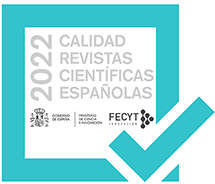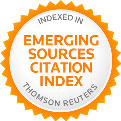La perseverancia y pasión en la consecución de objetivos: Validación española de la Escala Grit de Duckworth. [Perseverance and passion in achieving the objectives: Spanish Validation of the Duckworth’s Grit Scale].
Resumen
El concepto de Grit, que ha sido definido como perseverancia en el esfuerzo y consistencia en los intereses para la consecución de unos objetivos. Ha recibido una gran atención por sus posibilidades de predecir el éxito en diferentes ámbitos. El objetivo del presente estudio fue validar la escala Grit al idioma español. Se ha contado con una muestra de 303 participantes, 123 hombres y 180 mujeres, de edades comprendidas entre los 20 y 30 años. Se comprobó mediante análisis factorial confirmatorio que la estructura de dos factores de la escala original presenta un ajuste razonable en la muestra española, tanto para los hombres como para las mujeres. Los coeficientes de fiabilidad obtenidos fueron semejantes a los de la versión original. Los factores de la escala se relacionaron positivamente con la Escala de Persistencia Motivacional. En conclusión, la versión española de la Escala Grit mantiene la estructura factorial de la original, y tiene unas propiedades psicométricas aceptables. Por lo tanto, puede resultar aplicable y útil para su empleo en diferentes entornos culturales y deportivos de habla hispana.
Abstract
Grit, defined as perseverance of effort and consistency of interest, has attracted great attention as a predictor of success in different fields. The aim of the present study was to validate the Grit scale into the Spanish language. The sample was composed of 303 participants (123 men and 180 women) aged between 20 to 30 years. The confirmatory factor analysis showed that the two-factor structure of the original scale has a reasonable fit in the Spanish sample, in both men and women. The reliability coefficients obtained were closer to those of the original version. Additionally, the subscales were positively related to the Motivational Persistence Scale. In conclusion, the Spanish version of the Grit Scale maintains the factorial structure of the original scale and has similar psychometric properties. Therefore, it can be applicable and useful in Spanish-speaking contexts.
https://doi.org/10.5232/ricyde2018.05401
Referencias/references
Ali, J., & Rahaman, A. (2012). A comparative study of grit between male and female fencers of Manipur. International Journal of Movement Education and Social Sciences, 2(1), 10-12.
Buller, E. F. (2012). The Relationship between Grit and Academic, Military and Physical Performance at the United States Military Academy. (Doctoral Dissertation). University of Kansas, Kansas (USA).
Byrne, B. M. (2008). Testing for multigroup equivalence of a measuring instrument: A walk through the process. Psicothema, 20(4), 872-882.
Chenung, G. W., & Rensvold, R.B. (2002). Evaluating Goodness-of-Fit Indexes for Testing Measurement Invariance. Structural Equation Modeling, 9(2), 233–255.
https://doi.org/10.1207/S15328007SEM0902_5
Constantin, T.; Holman, A., & Hojbota, M. A. (2011). Development and Validation of a Motivational Persistence Scale. Psihologija, 45 (2), 99–120.
https://doi.org/10.2298/PSI1202099C
Costa, P.T. Jr., & McCrae, R. R. (1992). The Revised NEO Personality Inventory (NEO-PI-R) and NEO-Five-Factor Inventory (NEO-FFI) Professional Manual. Odessa, FL: Psychological Assessment Resources.
Cox, C. M. (1926). The Early Mental Traits of Three Hundred Geniuses. Stanford, CA: Stanford University Press.
Credé, M.; Tynan, M. C., & Harms, P. D. (2017). Much a do about Grit: A meta-analytic synthesis of Grit literature. Journal of Personality and Social Psychology 113(3), 492-511.
https://doi.org/10.1037/pspp0000102
Datu, J. A. D.; Yuen, M., & Chen, G. (2016). Exploring determination for long-term goals in a collectivist context: A qualitative study. Current Psychology, 1-9.
https://doi.org/10.1017/jgc.2016.2
Grit: the power of passion and perseverance. Recuperado de:
https://www.youtube.com/watch?v=H14bBuluwB8
Duckworth, A. (2016). Grit. El poder de la pasión y la perseverancia. Madrid: Ediciones Urano.
Duckworth, A. L.; Peterson, C.; Matthews, M. D., & Kelly, D. R. (2007). Grit: Perseverance and passion for long-term goals. Journal of personality and social psychology, 92(6), 1087-1101.
https://doi.org/10.1177/1948550610385872
Duckworth, A. L., & Quinn, P. D. (2009). Development and validation of the short grit scale (grit–s). Journal of personality assessment, 91(2), 166-174.
https://doi.org/10.1080/00223890802634290
Duckworth, A. L.; Kirby, T. A.; Tsukayama, E.; Berstein, H., & Ericsson, K. A. (2011). Deliberate practice spells success why grittier competitors triumph at the national spelling bee. Social Psychological and Personality Science, 2(2), 174-181.
http://dx.doi.org/10.1177/1948550610385872
Duckworth, A. L.; Quinn, P. D.; Lynam, D. R.; Loeber, R., & Stouthamer-Loeber, M. (2011). Role of test motivation in intelligence testing. Proceedings of the National Academy of Sciences, 108(19), 7716-7720.
https://doi.org/10.1073/pnas.1018601108
Duckworth, A., & Groos, J. J. (2014). Self-Control and Grit: Related but Separable Determinants of Success.
Current Directions in Psychological Science., 23(5), 319–325.
https://doi.org/10.1177/0963721414541462
https://doi.org/10.3102/0013189X15584327
Dumfart, B., & Neubauer, A. C. (2016). Conscientiousness Is the Most Powerful Noncognitive Predictor of School Achievement in Adolescents. Journal of Individual Differences, 37(1), 8–15.
https://doi.org/10.1027/1614-0001/a000182
Ericsson, K. A.; Krampe, R. T., & Tesch-Römer, C. (1993). The role of deliberate practice in the acquisition of expert performance. Psychological Review, 100(3), 363-406.
https://doi.org/10.1037/0033-295X.100.3.363
Ericsson, K. A., & Charness, N. (1994). Expert performance: Its structure and acquisition. American Psychologist, 49(8), 725-747.
http://dx.doi.org/10.1037/0003-066X.49.8.725
Eskreis-Winkler, L., Shulman, E. P., Beal, S. A., & Duckworth, A. L. (2014). The Grit effect: Predicting retention in the military, the workplace, school and marriage. Frontiers in Psychology, 5 (36), 1-12.
https://doi.org/10.3389/fpsyg.2014.00036
Galton, F. (1892). Finger Prints. Londres: Mcmillan
García, V., Ruiz, L. M., & Graupera, J. L. (2013). Inteligencia Emocional en el Deporte: Validación española del Schutte Self Report Inventory (SSRI) en deportistas españoles. Cuadernos de Psicología del Deporte, 13(1), 25-36.
https://doi.org/10.4321/S1578-84232013000100004
Hui, C. H., & Triandis, H.C. (1985) Measurement in Cross-Cultural Psychology: A review and comparison of strategies. Journal of Cross-Cultural Psychology, 16(2): 131-152.
https://doi.org/10.1177/0022002185016002001
Hough, L. M. (1992). The 'big five' personality variables construct confusion: Description versus prediction. Human performance, 5(1-2), 139-155.
https://doi.org/10.1080/08959285.1992.9667929
John, O. P., & Srivastava, S. (1999). The big five trait taxonomy: History, measurement, and theoretical perspectives. Handbook of personality: Theory and research, 2(1999), 102-138.
Kim, Y-J. (2015). The International Comparison on the Grit and Achievement Goal Orientation of College Students: Focusing on the college students in Korea, China, and Japan. Advanced Science and Technology Letters, 119, 10-13.
https://doi.org/10.14257/astl.2015.119.03
Lievens, F., & Sackett, P. R. (2012). The validity of interpersonal skills assessment via situational judgment tests for predicting academic success and job performance. Journal of Applied Psychology, 97(2), 460-468.
https://doi.org/10.1037/a0025741
Lisbona, A.; Palací, F. J., & Castaño, M. B. (2016). ¿Podemos apasionarnos por el trabajo?: Una revisión de la pasión para el trabajo. Papeles del Psicólogo, 37 (3), 165-169.
Muñiz, J., & Hambleton, R. K. (1996). Directrices para la traducción y adaptación de los tests. Papeles del Psicólogo, 66.http://www.papelesdelpsicologo.es/resumen?pii=737
Rimfeld, K.; Kovas, Y.; Dale, P. S., & Plomin, R. (2016). True grit and genetics: Predicting academic achievement from personality. Journal of Personality and Social Psychology, 111(5), 780-789.
https://doi.org/10.1037/pspp0000089
https://doi.org/10.103/a0026838
Robbins, S. B.; Lauver, K.; Le, H., Davis, D.; Langley, R., & Carlstrom, A. (2004). Dopsychosocial and study skill factors predict college outcomes? A meta-analysis.
Psychological Bulletin, 130(2), 261-288.
https://doi.org/ 10.1037/0033-2909.130.2.261
Robertson-Kraft, C., & Duckworth, A. L. (2014). True grit: Trait-level perseverance and passion for long-term goals predicts effectiveness and retention among novice teachers. Teachers College Record, 116(3), 1-27.
https://doi.org/10.1016/j.ijpsycho.2013.04.007
Salles, A.; Cohen, G. L., & Mueller, C. M. (2014). The relationship between grit and resident well-being. The American Journal of Surgery, 207(2), 251-254.
https://doi.org/ 10.1016/j.amjsurg.2013.09.006.
Scanlan, T. K.; Carpenter, P. J.; Schmidt, G. W.; Simons, J. P., & Keeler, B. (1993). An introduction to the sport commitment model. Journal of Sport & Exercise Psychology, 15, 1-15.
https://doi.org/10.1123/jsep.15.1.1
https://doi.org/10.1027/1015-5759/a000407
Silvia, P. J.; Eddington, K. M.; Beaty, R. E.; Nusbaum, E. C., & Kwapil, T. R. (2013). Gritty people try harder: Grit and effort-related cardiac autonomic activity during an active coping challenge. International Journal of Psychophysiology, 88(2), 200-205.
https://doi.org/ 10.1016/j.ijpsycho.2013.04.007
Singh, K., & Jha, S. D. (2008). Positive and negative affect, and grit as predictors of happiness and life satisfaction. Journal of the Indian Academy of Applied Psychology, 34(2), 40-45.
Terman, L. M. (1925). Genetic studies of genius. Mental and physical traits of a thousand gifted children. Palo Alto, CA: Stanford Univ. Press.
Vallerand, R. J. (2012). The role of passion in sustainable psychological well-being. Psychology of Well-Being: Theory, Research and Practice, 2(1).
http://www.psywb.com/content/2/1/1
Van Rossum, J. H. A., & Gagné, F. (2005) Talent development in sports. En F.A. Dixon, y S. M. Moon (eds.), The Handbook of Secondary Gifted Education (pp. 281-316). Waco, TX: Prufrock Press.
Von Culin, K. R.; Tsukayama, E., & Duckworth, A. L. (2014). Unpacking grit: Motivational correlates of perseverance and passion for long-term goals. The Journal of Positive Psychology, 9(4), 306-312.
http://dx.doi.org/10.1080/17439760.2014.898320
Palabras clave/key words
Texto completo/Full Text:
PDF------------------------ 0 -------------------------
RICYDE. Revista Internacional de Ciencias del Deporte
![]()

Publisher: Ramón Cantó Alcaraz
ISSN:1885-3137 - Periodicidad Trimestral / Quarterly

